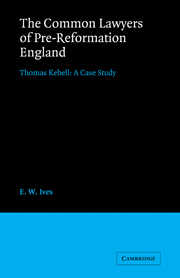Book contents
- Frontmatter
- Contents
- List of figures and tables
- Preface
- Abbreviations
- Manuscript sources
- Table of cases
- Introduction
- PART I THE LEGAL PROFESSION
- 1 The common lawyers in pre-Reformation England
- 2 Social origins: the Kebells of Rearsby
- 3 Training at the inns of court
- 4 Professional advancement
- PART II LEGAL PRACTICE
- PART III THE LAWYERS AND THE LAW
- PART IV THE PROFESSION AND SOCIETY
- Appendices
- Index
1 - The common lawyers in pre-Reformation England
Published online by Cambridge University Press: 05 November 2011
- Frontmatter
- Contents
- List of figures and tables
- Preface
- Abbreviations
- Manuscript sources
- Table of cases
- Introduction
- PART I THE LEGAL PROFESSION
- 1 The common lawyers in pre-Reformation England
- 2 Social origins: the Kebells of Rearsby
- 3 Training at the inns of court
- 4 Professional advancement
- PART II LEGAL PRACTICE
- PART III THE LAWYERS AND THE LAW
- PART IV THE PROFESSION AND SOCIETY
- Appendices
- Index
Summary
The contrast between medieval and modern society has been variously described as an antithesis between faith and reason, scholasticism and classical learning, personal monarchy and state bureaucracy; in England it could equally well be considered as a contrast in attitudes to law. In the twentieth century it is a commonplace that personal freedom and the right to property depends upon the law of the land, but the overt importance of the law in everyday life is slight. Popular opinion regards it either as a body of statutes creating obligations and conferring benefits, or as a protection against crime, while certain political circles even see law as inappropriate to regulate important contractual relations. To consider the small print of an agreement is unusual, a lawsuit is a grave step only undertaken in the last resort, and administration – central and local – is the business of civil servants, government departments and quangos, not the police and the courts.
It was quite otherwise under the rule of the Yorkist and Tudor sovereigns; English society was intensely ‘law-minded’, obsessed with legal considerations, legal rights and legal remedies. Even the mutual obligations of the family were put into legal form. Husbands and wives tied each other to the terms of the marriage settlement as tightly as the law allowed. The profitable disposal of children in employment or wedlock called for bonds, indentures and obligations; one father even made his student son at Thavies Inn provide a mentor with an IOU to be called in should the boy slack!
- Type
- Chapter
- Information
- The Common Lawyers of Pre-Reformation EnglandThomas Kebell: A Case Study, pp. 7 - 22Publisher: Cambridge University PressPrint publication year: 1983



